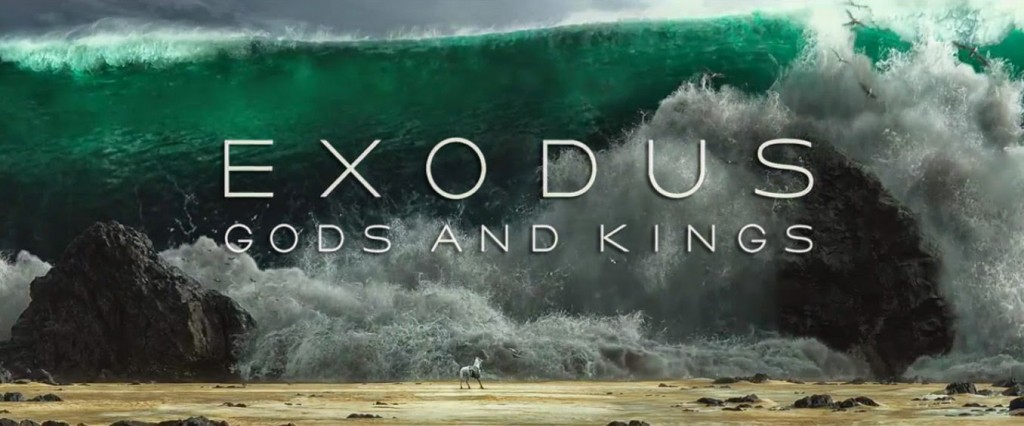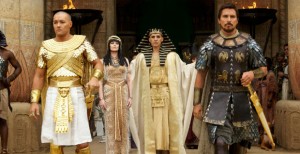Gladiator meets God. Welcome to Exodus: Gods and Kings, the latest sword-and-sandals epic from director Ridley Scott. Having got Russell Crowe to announce what echoes in eternity, Scott tackles a true story bigger than Ben-Hur. A true story of great escape from injustice and slavery, set thousands of years ago in Egypt. A true story involving God, kings, humans, plagues, Red Sea parting, and letting my people go.
As if getting all that into a 3D movie is not hard enough, the most daring element is it’s a true story taken from the Bible. Cue: instant concern or outrage from many who hold firm to the Bible’s record. Christians rightly fear that movie adaptations of God’s Word will not accurately represent it. As was the case this year with Noah, Exodus confirmed those fears from the get-go. Scott and his cast never claimed to be creating a steadfast work of Christian piety, let alone Jewish. This is a movie, folks.

Weeks before Exodus was released this month, select sequences were exclusively shown in Sydney to a clutch of Christians who review films. Yes, life is a slog. Choc-top? Impossible to properly review any film based on only a few bits. What can be revealed about how Exodus shapes up is… it’s not Noah. Both blockbusters use the biblical account as a guideline, adding some elements and ignoring others. But where Noah added stuff that demanded eye-rolling – giant stone angels, anyone? – Exodus seems to be less fanciful and mythic. However, while Exodus should be an ancient epic loaded with what audiences want from ancient epics, an anticipated similarity to Noah leaped out.
Just as Noah construed God to be a distant, fickle ‘creator’, Exodus also focuses primarily upon the human leaders involved in events of divine construction. Go d has been sidelined from his own story. Moses (Christian Bale) is introduced as a brother to Pharaoh-to-be Ramses (Joel Edgerton). How Moses comes to lead Israelite slaves out from the tyranny of Ramses, involves prophecies, family secrets and an inflamed sense of liberty. Scott and Exodus’ four screenwriters serve some first-rate melodrama, as the escalating battle between national leaders flows from their personal issues and humanitarian differences.
d has been sidelined from his own story. Moses (Christian Bale) is introduced as a brother to Pharaoh-to-be Ramses (Joel Edgerton). How Moses comes to lead Israelite slaves out from the tyranny of Ramses, involves prophecies, family secrets and an inflamed sense of liberty. Scott and Exodus’ four screenwriters serve some first-rate melodrama, as the escalating battle between national leaders flows from their personal issues and humanitarian differences.
But the portrait of Moses as rational bureaucrat turned freedom fighter is a creative re-imagining of its source material. Scenes of Moses’ learning his hidden past and prophetic role, don’t match what the book of Exodus documents. Much like Noah presenting its human hero as an environmental disciple able to determine morality, Exodus hoists Moses as “an incarnation of freedom” (according to Scott). Missing from these new versions of ancient events is the commanding lead role played by God. Not hard to understand why. Echoes what so many people think, every day.
God being written out of his story is subtly blared by Scott’s rendering of the famous plagues. The flood of blood, or locust legions, provide cinematic spectacle. They even bring substance to style, by indicating how such ferocious onslaughts would make life a living hell. However, apart from Moses strongly hinting that God will strike Ramses’ kin, the plagues of Exodus unfurl like a linked chain of natural disasters. These Exodus clips give no voice to God, as if he has nothing to say about what’s happening.
Those behind Exodus must feel comfortable treating the Bible as any other book. Open to re-interpretation, fabrication or renovation. Removing God from centre-stage, though, means having to explain divine events without using the explanation given by their architect. Sounds like a reasonable strategy. After all, what were the Exodus events about, if they weren’t solely about human freedom? Who needs to know God’s side of things? We just need Moses, and his fight against the sort of social ills so many of us loathe.
Thing is, when Moses becomes the hero, the true story of God’s dealings become more confused and unbelievable. Distorting the biblical accounts, produces an Exodus where God appears angry and vengeful, yet plays favourites – as well as second-fiddle to the human leader he chose. Where is the sense in this God, who devastates an entire nation but protects another? Why didn’t he just love everybody, or wipe them all out?
The previewed scenes of Exodus represent God’s story as if he is not playing the lead. As Moses and Ramses scrap it out on-screen, though, ask yourself what happens to meaning, purpose and clarity when God is sidelined. Rather than subtracting God, keep considering what his reasons truly reveal about what he has done – and continues to do.
Exodus is in Australian cinemas from December 4. You can read Eternity’s review of the movie on Tuesday 2 December.
Email This Story
Why not send this to a friend?
